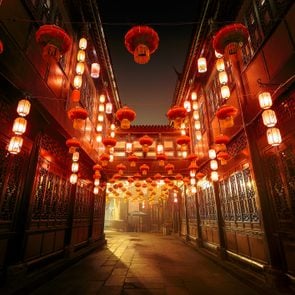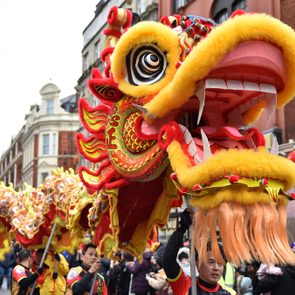Chinese Zodiac Elements: Find Out Yours and Learn What It Means
Updated: Jun. 24, 2024

Understanding the five Chinese zodiac elements can help you find balance, success and luck in all areas of your life
The Chinese zodiac system is thousands of years old. It is full of history and ancient traditions (like the Lunar New Year) and offers an incredibly detailed perspective of the world and the heavens. Similar to Western astrology, Chinese astrology is defined by its 12 zodiac signs: Rat, Ox, Tiger, Rabbit, Dragon, Snake, Horse, Sheep (or Goat), Monkey, Rooster, Dog and Pig. Other natural forces are at work here as well, including the five elements of the Chinese zodiac: Fire, Earth, Metal, Water and Wood. These Chinese zodiac elements describe the fundamental components of everything in the universe and how they relate to one another. And since you’re part of the universe, they affect you too.
Each year has a specific element assigned to it, and between the five elements and the 12 zodiac signs, that creates a 60-year cycle. Here’s where things get a little complicated: Any given element affects the year as a whole and everyone in it, as you’ll see with 2024’s Year of the Wood Dragon (2023 was the Year of the Water Rabbit). However, it also specifically influences the personalities and proclivities of those born during that year.
Understanding the Chinese zodiac elements can help you learn more about yourself. That’s why Reader’s Digest spoke to astrologer Susan Levitt to see how knowing the elements can help balance your life—from how you manage your health to the life choices you should (and perhaps shouldn’t) make. So keep reading to find out yours.
Get Reader’s Digest’s Read Up newsletter for more zodiac insight, holiday tips, humor, cleaning, travel, tech and fun facts all week long.
About the expert
|
What is the origin of the Chinese zodiac elements?
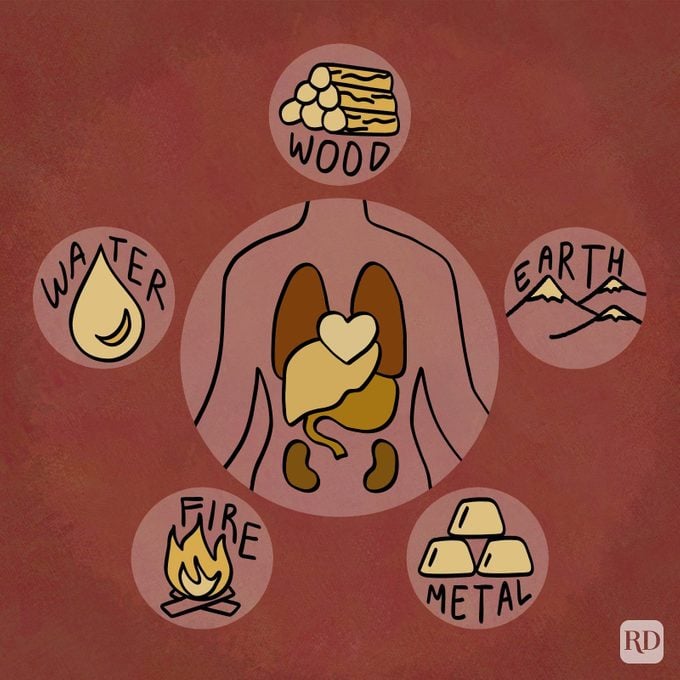
Levitt explains that the Five Elements Theory was crucial to how the ancient Chinese understood the human body. “Each of these five elements coordinate to elements of the body and meridians in Chinese medicine,” she says. Fire corresponds to the heart, Earth to the stomach, Metal to the lungs, Water to the kidneys and Wood to the liver.
Traditional Chinese medicine associates issues in the body with imbalances in the elements, and it may point to different areas you need to strengthen. While everyone should pay attention to these elements, those born in years that correlate to them may need to pay particular attention to them; for example, those born in a Wood year should be wary of their digestive system, along with the conditions of their heart and eyes.
Each of the Chinese zodiac elements corresponds to different seasons and months of the year: Fire is summer, Metal is autumn, Water is winter and Wood is spring. Earth corresponds to seasonal transitions (i.e., the last few weeks of each season). On a larger scale, as mentioned earlier, each year has its own designated element. Since 2024 is a Wood year, it is imbued with the characteristics of the Wood element, such as optimism and courage. The same goes for all the other elements and their respective characteristics, so you can get a sense of what the year may bring, especially if you also understand how it meshes with your own zodiac sign and element. You might notice some similarities with Western astrology’s zodiac elements as well.
What is my Chinese zodiac sign and element?
And now for what you’re really curious about: your own Chinese zodiac element and how it affects your life. After all, even if you’re born in, say, a Dragon year, Fire Dragons will be different than Wood Dragons, Water Dragons and so on. Plus, to find your Chinese zodiac sign, simply find the sign that aligns with the year you were born. Scroll below to find out more details on the Chinese zodiac elements, along with which birth years correspond to which elements to better understand what makes you, well, you.
Fire
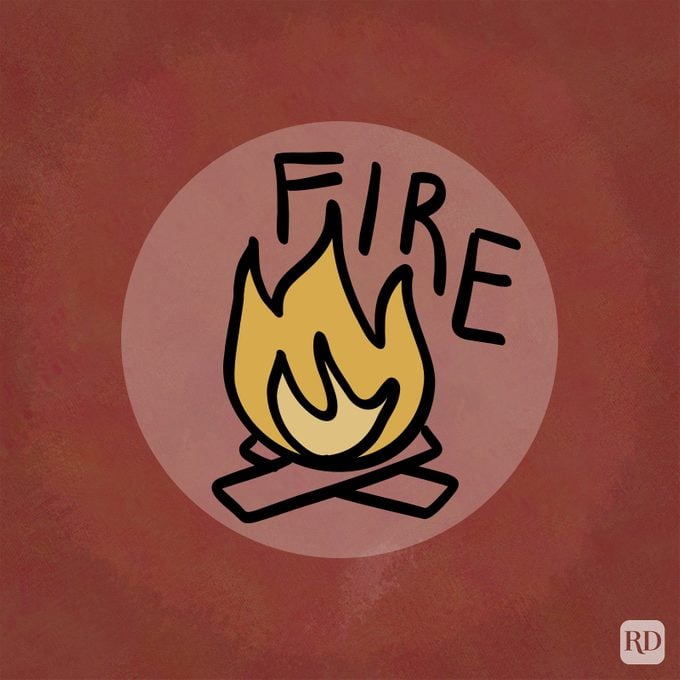
Fire birth years: End in numbers 6 and 7
Colors: Red (yang), purple (yin)
Planet: Mars
Climate: Hot
Body organs: Heart (yin), small intestines (yang)
Fire is an aggressive element, so people associated with this zodiac element are very direct and expressive and tend to be leaders. “A Fire type succeeds by becoming warmhearted and generous,” explains Levitt. That means embracing their innate sense of love, passion and spirituality. However, this Chinese zodiac element can have negative tendencies for vanity, jealousy and frustration. “The challenge for a Fire type is to share joy and laughter without thought of reward.”
According to Levitt, your power color is red (yang/masculine energy) if you are born in a year that ends in the number 6. Your color is purple (yin/feminine energy) if your year ends in the number 7. The color red indicates stronger, more aggressive energy. Levitt also notes that “a red sign is extremely resilient and can miraculously overcome most illnesses.” The color purple indicates sensuality and emotional intensity. “A purple sign may have a disposition to develop a weak heart due to emotional stress.”
Earth
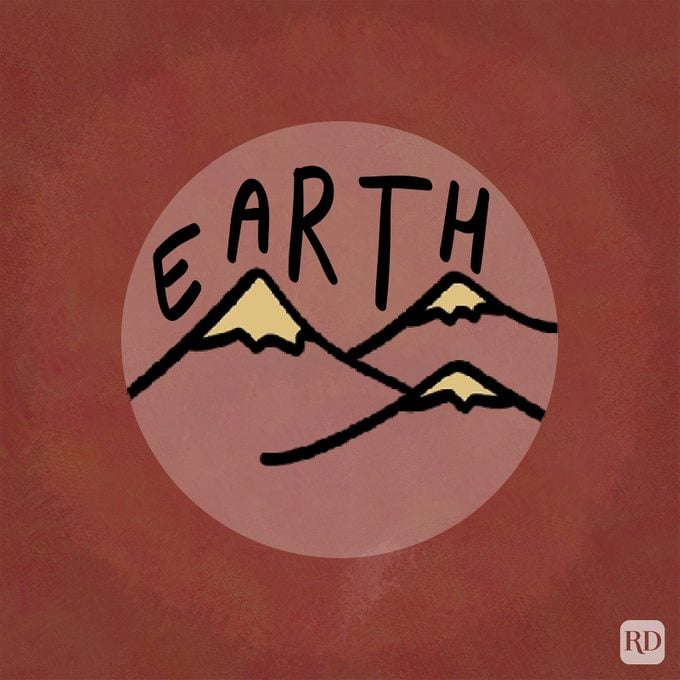
Earth birth years: End in numbers 8 and 9
Colors: Yellow (yang), gold (yin)
Planet: Saturn
Climate: Damp
Body organs: Spleen (yin), stomach (yang)
Earth is a practical, reliable element, but it is also defined by its sense of honesty, kindness and empathy. People associated with this element are nurturing, like Mother Earth. They are also thoughtful and pensive. “An Earth individual does well to meditate and contemplate,” Levitt says. “It is important for those born in an Earth year to nourish themselves physically, emotionally and spiritually.”
Your color is yellow (yang/masculine energy) if your year ends in the number 8. Your color is gold (yin/feminine energy) if it ends in the number 9. According to Levitt, “People born in a golden year are considered fortunate and will always be taken care of and have their needs met.”
Metal
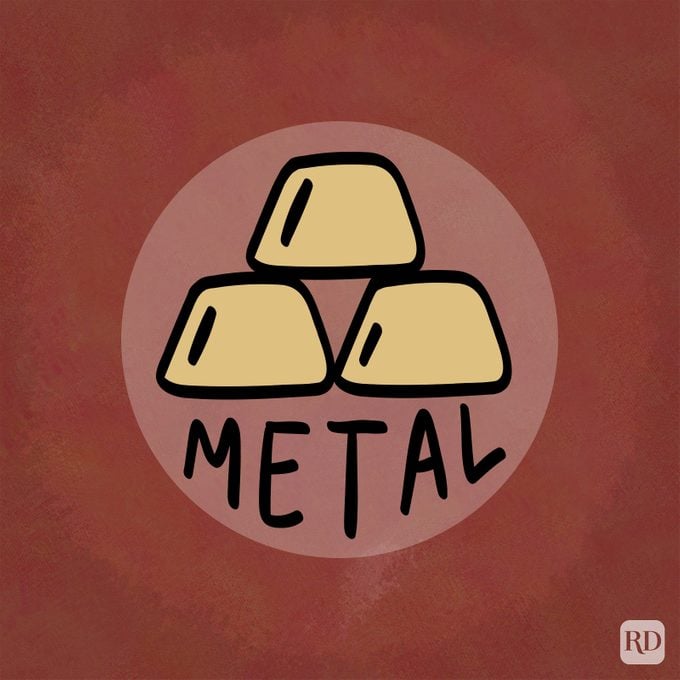
Metal birth years: End in numbers 0 and 1
Colors: White (yang), silver (yin)
Planet: Venus
Climate: Dry
Body organs: Lungs (yin), large intestines (yang)
Metal is the Chinese zodiac element associated with industry and weaponry. People connected to this element are as strong as steel. They are also independent and focused and can be quite intense. In fact, these people can sometimes be too unrelenting and often put up a tough front when they refuse to deal with their emotions. “The Metal personality is very determined and powerful,” says Levitt. “One born in a Metal year succeeds by being less opinionated, accepting change and gracefully releasing the past.”
Your color is white (yang/masculine energy) if your year ends in the number 0. Your color is silver (yin/feminine energy) if it ends in the number 1. Levitt says that white signs are symbolized by a weapon, while silver signs are symbolized by a kettle. When Metal is masculine, it is industrious in an aggressive, powerful way; in its feminine form, it is industrious in a more supportive and structural way.
Water
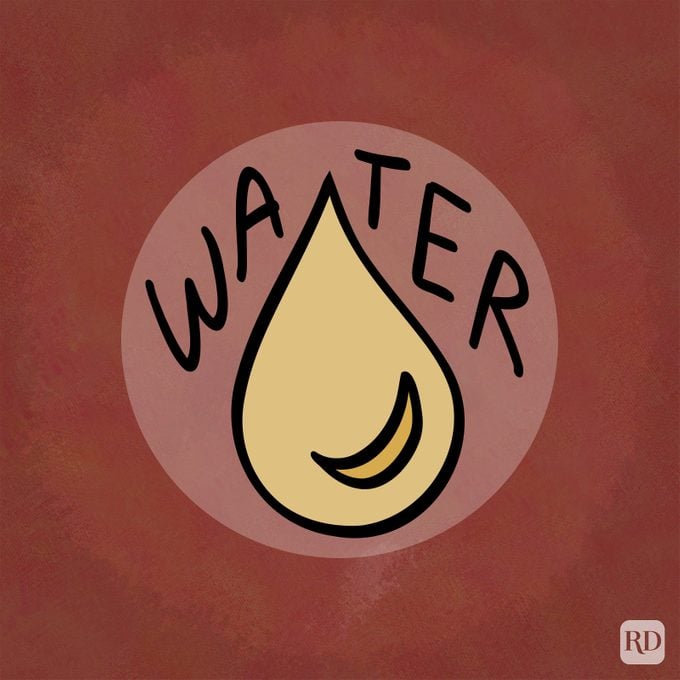
Water birth years: End in numbers 2 and 3
Colors: Black (yang), gray (yin)
Planet: Mercury
Climate: Cold
Body organs: Kidneys (yin), bladder (yang)
Much like the water signs of the Western zodiac, people associated with this Chinese zodiac element are known for being creative, sensitive and reflective. More than any other element, Water resides in emotions. “Water types value family and social contacts and possess the ability to attract,” Levitt says. “Those born in a Water year succeed by not allowing fear to block the fullest expression of creativity.”
Your color is black (yang/masculine energy) if it ends in the number 2. Your color is gray (yin/feminine energy) if it ends in the number 3. Black signs are symbolized by a wave, while gray signs are symbolized by a brook. Again, this demonstrates the contrast in masculine and feminine representations of the element; the former is more aggressive, while the latter is calm.
Wood
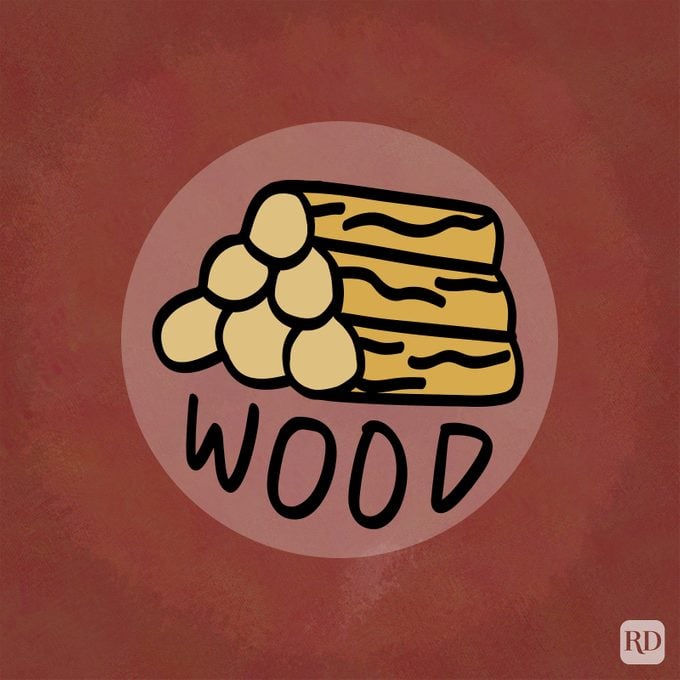
Wood birth years: End in numbers 4 and 5
Colors: Green (yang), blue (yin)
Planet: Jupiter
Climate: Windy
Body organs: Liver (yin), gallbladder (yang)
Remember, 2024 is the Year of the Wood Dragon! Wood signifies growth and enthusiasm. This Chinese zodiac element is associated with idealism, bold action and imagination. “Wood types possess decision-making skills and the ability to create change,” Levitt states. People connected to this element can also be very competitive and are susceptible to negative emotions like discouragement and anger. “The challenge for a Wood type is to learn to control anger and channel it into positive work that benefits all people.”
Your color is green (yang/masculine energy) if your year ends in the number 4. Your color is blue (yin/feminine energy) if it ends in the number 5. Green signs are symbolized by a pine tree, which indicates sturdy, upright and enduring qualities. Blue signs are symbolized by bamboo, which is a plant that finds strength in its flexibility.
Why trust us
At Reader’s Digest, we’re committed to producing high-quality content by writers with expertise and experience in their field in consultation with relevant, qualified experts. We rely on reputable primary sources, including government and professional organizations and academic institutions as well as our writers’ personal experience where appropriate. For this story on Chinese zodiac elements, Reader’s Digest spoke with Susan Levitt, an astrologer and author of Taoist Astrology: A Handbook of the Authentic Chinese Tradition. We verify all facts and data, back them with credible sourcing, and revisit them over time to ensure they remain accurate and up to date. Read more about our team, our contributors and our editorial policies.
Source:
- Susan Levitt, astrologer and author of Taoist Astrology: A Handbook of the Authentic Chinese Tradition.






















